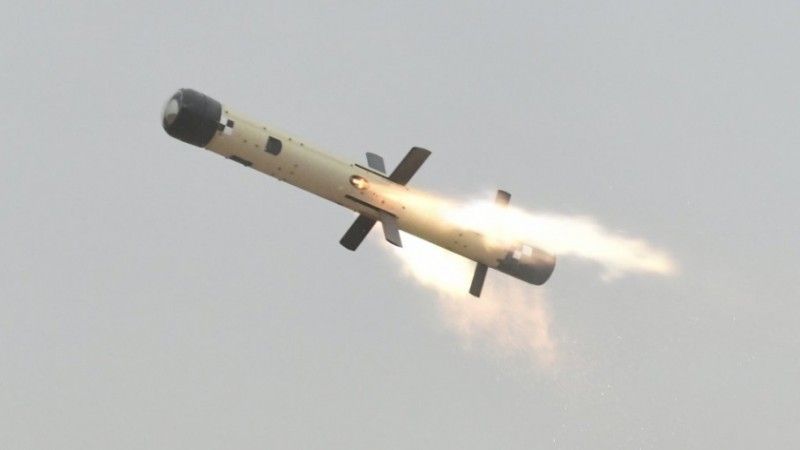Industry
Mesko ready to produce the new Spike

The Mesko company, belonging to the Polish Armaments Group, is ending the production of a batch of Spike-LR anti-tank missiles for the needs of the Polish Armed Forces this year. Currently, its offer includes the Spike-LR2 missiles, with significantly increased combat capabilities and fully compatible with existing and new launchers - We are ready to smoothly move to the production of Spike LR2 missiles, especially since certain elements, such as the low-smoke engine, have been already implemented for production as part of the current batch of Spike LR1 - emphasizes Elżbieta Śreniawska, president of the Management Board of Mesko SA.
The Spike-LR anti-tank missiles are one of the basic means of anti-tank defense in the Polish Army. They can engage armored targets at distances of up to 4 km, including those invisible to the operator, both from the front and the upper hemisphere. This is possible thanks to the guidance system integrating the fiber optic link, as well as thermal and television cameras. All these elements contribute to the high effectiveness of the Spike ATGM, even against heavily armored tanks.
The producer of the Spike missiles is the Israeli based Rafael, but in Poland they are delivered under license by Mesko SA, which belongs to PGZ. The first batch of Spike ATGMs, including 2,675 rounds, was delivered by 2013. Some of these missiles have already been used up in practice firing, and others are re-certified to extend their service life.
The Technical Modernization Plan for 2013-22 included an order for another batch of one thousand Spike-LR missiles to replenish the existing supplies, also with a view to using them on self-propelled launchers for the Rosomak APC. A contract worth about PLN 600 million was signed at the end of 2015, and deliveries started in 2018.
This year the Skarżysko-based company plans to complete deliveries of the Spike ATGM from the new batch. Although they are still the Spike-LR1 missiles, they have some modifications, including a marching engine with a reduced smoke effect. Mesko has the infrastructure developed over several years to implement the Spike program. There was a break of several years between the production of both batches of missiles, so when work on the second contract began, it was necessary to certify the entire existing production line. During this work, a number of modifications were introduced, increasing the share of the Polish company in the production of the missile.
Today, Mesko's offer includes a new version of the Spike missile, namely the Spike LR2. It has a number of new capabilities and is compatible with all Spike LR launchers. Mesko may start producing the new variant of the Spike missiles as soon as the current batch ends. - says Elżbieta Śreniawska, president of the Management Board of Mesko SA.
In an interview with Defence24.pl, Marcin Ożóg, Member of the Management Board of Mesko, emphasizes that a current infrastructure can be used in smooth transition to the production of Spike LR2 will avoid the costs to recertify the entire production line and will accelerate the delivery time of missiles. The Skarżysko company is already largely prepared to deliver new types of missiles, because some of their elements, such as a low-smoke rocket engine, have already been introduced under the Spike LR1 program. The operation of the latter element was confirmed during test shooting conducted in Poland.
The introduction of the Spike LR2 missiles will significantly strengthen the anti-tank defense of the Polish Armed Forces. They have a number of new capabilities, and at the same time are fully compatible with both the existing portable launchers and those on the ZSSW-30 turrets. Spike missiles will also be able to be fired from the modernized Mi-24 helicopters and Ottokar-Brzoza tank destroyers, if they are equipped with Spike launchers, as well as from any other platform that the Polish Army decides to integrate. Compared to the currently used Spike LR1, the LR2 missiles have a range extended to 5.5 km and a new warhead, but also a significantly modernized guidance system. All these capabilities become available for new and existing Spike ATGM launchers in the Polish Armed Forces - Przemysław Kowalczuk, Member of the Management Board of Mesko
The Spike LR2 guidance system has a new non-cooled thermal imaging camera, which increases the observation characteristics, while shortening the time to achieve combat readiness. The day sensor is also modified, and the guidance system ensures the simultaneous use and connection (fusion) of data from both cameras. The warhead is also improved.
Przemysław Kowalczuk reminds that Spike LR2 are fully compatible with all launchers adapted to firing Spike LR missiles. The new missiles could therefore be used as an armament for portable launchers, of which the Polish Army currently has 264, but also for the ZSSW-30 unmanned turrets, which will first be used on the Rosomak transporters, and in the future on the Borsuk IFV. Let us recall that the ZSSW-30 system integrated with the APC has successfully completed the qualification tests recently, and only the first batch of these turrets for the Rosomaks is to include 341 transporters.
These missiles, however, can also be installed on the modernized Mi-24 (and other) helicopters and tank destroyers, if they are adapted to firing missiles from the Spike family. What kind of missiles from the Spike family will be used depends on the ordering party. According to Rafael representatives, each variant can be applied. Importantly, the Spike LR2 can also be fired from launchers that are adapted to the heavier projectiles of the Spike family, such as the Spike ER / ER2.
Representatives of the Israeli based Rafael emphasize, in turn, that the Spike missile family is being developed all the time and the transfer of new technologies related to it is included in the principles of cooperation with various user countries of this system. They were sold to 37 countries around the world. The countries that previously had Spike LR missiles in service and decided to use the LR2 version include Germany, Slovenia and Latvia. In turn, relatively recently, other countries in our region that had not previously used Spike missiles, such as Estonia, Slovakia, Denmark and Hungary, decided to purchase Spike LR2. The last two of the indicated countries integrate the Spike ATGM on vehicles, in Denmark they will be Piranha V and Eagle V vehicles with Kongsberg RS4 weapon modules, while in Hungary - the newly acquired Lynx IFV.
All of this means that expanding participation in the Spike program may have additional benefits for Mesko within Rafael's supply chain. - Rafael recognizes Mesko as a top tier producer. Recently, Mesko was certified by Rafael to manufacture a complete Spike LR launch container for a number of global customers as part of Rafael's supply chain. Rafael also collaborates with Mesko as a source of prototypes that Mesko produces from time to time in the context of developing new capabilities - emphasizes Roman Palaria, Head of Marketing & Business Development, Precision Tactical Weapon Systems, Rafael Advanced Defense Systems.
The Spike program has been running in Poland for almost two decades. Today, these missiles are an important element not only of the anti-tank defense of the Polish Army, but also of the Mesko plants owned by PGZ. As Przemysław Kowalczuk points out, a smooth transition to the production of Spike LR2 may therefore strengthen the operational capabilities of the Polish Armed Forces, but also significantly support the development of this key company of the Polish defense industry.
